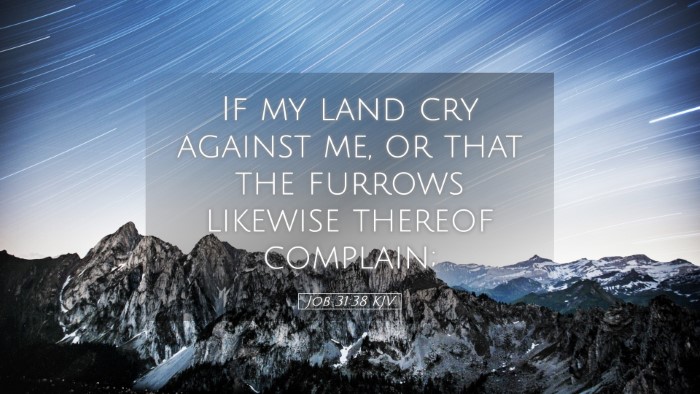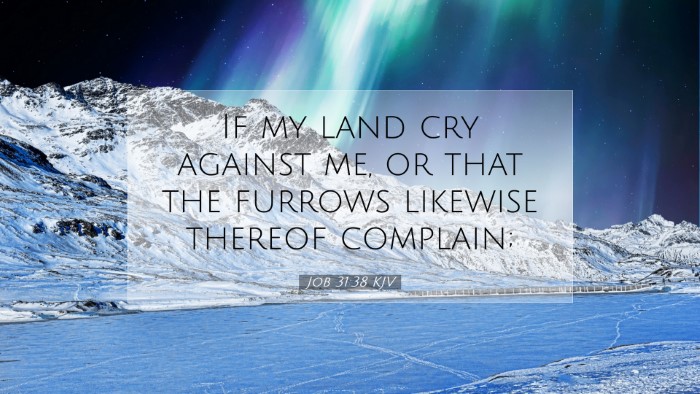Commentary on Job 31:38
Job 31:38 states: "If my land cry against me, or that the furrows likewise thereof complain."
Introduction
The book of Job stands as a timeless testament to human suffering and the quest for understanding amidst adversity. As Job reflects on his life and actions, he makes a solemn declaration regarding his integrity and the integrity of his dealings, especially concerning his land and agricultural responsibilities.
Context of the Verse
This verse comes at the culmination of Job's defense of his righteousness amidst accusations from his friends. Job seeks to reaffirm his moral integrity and his just treatment of others, including his land and the socio-economic implications of land ownership and care for the earth.
- Historical Background: In ancient Israel, land was not just a means of sustenance but also a divine inheritance. Thus, how one dealt with land bore significant spiritual implications.
- Theological Implications: This passage highlights the interconnectedness between human actions and the created order, suggesting that neglect or abuse of land has spiritual consequences.
Insights from Matthew Henry
Matthew Henry emphasizes the moral responsibility that one has over their possessions. In his commentary on this verse, he asserts that if Job's land were to testify against him, it would indicate a betrayal of the very blessings he has received.
- Testimony of Creation: Henry posits that creation itself bears witness to human conduct, illustrating the premise that nature reflects the condition of the human heart.
- Divine Oversight: He also reminds readers that God is aware of all injustices, and even the land will bear witness to wrongdoings.
Contributions from Adam Clarke
Adam Clarke's expounding on this verse connects personal accountability with social justice. He remarks that agricultural products should reflect the ethical treatment by the owner and warns against exploitation and neglect.
- Call to Righteousness: Clarke interprets Job's lament as a commitment to uprightness, highlighting how a landowner's behavior impacts the land’s health.
- Spiritual Insight: He notes that Job's plea indicates a deeper understanding of the moral fabric that interweaves human actions with divine justice.
Reflections from Albert Barnes
Albert Barnes brings to light the legal aspects of Job’s discourse. He points out that if Job's land were to "cry," it could be seen as a witness in a legal setting, declaring Job's guilt in failing to care for his responsibilities.
- Land as a Witness: Barnes elucidates the imagery of the land crying out as indicative of failure to uphold justice and righteousness.
- Ownership and Accountability: He reinforces that ownership comes with moral obligations, urging that neglect or misdeeds will ultimately result in condemnation.
Theological Reflections
This verse invites Christians to reflect on their relationship not only with God but with the earth. The acknowledgment that land can 'cry out' against us reveals a profound understanding of stewardship as a biblical mandate.
- Stewardship of Creation: It emphasizes that stewardship over land involves ethical treatment toward both the earth and the marginalized who depend on it.
- Impact of Sin: The cry of the land can be viewed as a metaphor for the broader impact of sin on creation, indicative of the brokenness that results from humanity's failure to honor God through faithful stewardship.
Practical Applications
The implications of Job 31:38 extend into contemporary discussions on environmental ethics and social justice.
- Environmental Responsibility: Pastors and scholars are encouraged to teach their congregations about the importance of caring for the environment as a reflection of godly character.
- Social Justice: This scripture serves as a reminder to engage in practices that support the wellbeing of the community and the earth, thereby ensuring that our 'land' does not rise against us.
Conclusion
Job 31:38 powerfully encapsulates the ethical and spiritual dimensions of land ownership. It calls believers to introspection concerning their integrity, justice, and stewardship over God's creation. The combined insights from Matthew Henry, Adam Clarke, and Albert Barnes provide a rich tapestry of understanding that encourages serious consideration of biblical righteousness in practical, tangible ways.


